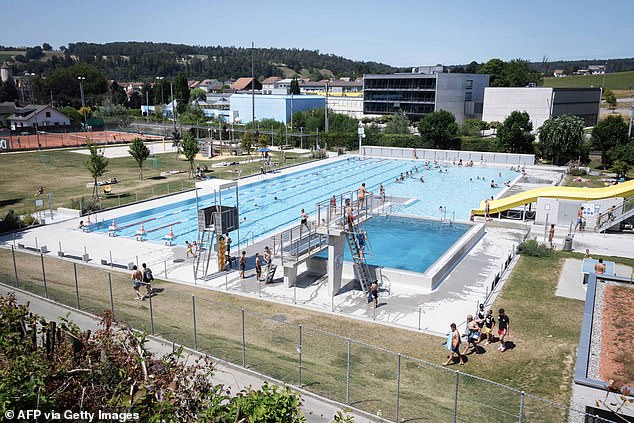
A public swimming pool in Switzerland has closed its doors to foreign visitors after overcrowding and reports of women and girls being sexually harassed.
The rule, mainly affecting people coming across the French border, was brought in by authorities in the town of Porrentruy at the start of the month and is expected to last for the whole summer.
In the last few weeks alone, some 20 incidents are reported to have occurred at the pool, each involving visitors from France who were then banned.
‘We have young girls who were followed and whistled at,’ city councillor Lionel Maitre said, adding that employees were also disrespected and even attacked in one case.
In response, access to the outdoor bathing area has been limited to Swiss nationals and holders of settlement and work permits.
The ‘blanket ban’ has been described as ‘problematic and irritating’ by the Swiss government’s Federal Commission Against Racism (FCR).
The commission’s president Ursula Schneider Schüttel suggested that the move may even contravene Article 8 of the country’s constitution, the principle of non-discrimination.
But Porrentruy Mayor Philippe Eggertswyler and city council members strongly denied that the measure amounted to discrimination against any section of the public.

The swimming pool of Porrentruy owned by the municipalty of the Swiss city, which is located 10km from the French border
‘The Federal Commission against Racism is doing its job, and we are doing ours,’ he said.
‘We need to look at the problem differently. There are huge crowds today, and it’s imperative that we ensure that the people of [the canton of] Jura can benefit from this infrastructure,’ he added.
‘Not all of these people came from neighboring France – some also came from Switzerland, but that’s the minority,’ Maitre said.
He described anti-social behaviour at the pool included the ‘harassment of young women’, people breaking the rules by ‘swimming in underwear’ as well as inappropriate language and ‘violent behavior.’
Maitre blamed the crowds at his city’s pool on public pool closures in France, saying French towns, plagued by the same problem of anti-social behaviour, would rather ‘close their pools completely than solve the problems.’
This, he suggested, meant young people from neighbourhoods near the border were going to Switzerland.
The council has faced backlash from the public and politicians in Switzerland and France.
Jura council member Mathilde Crevoisier called on the municipality to revoke the ban, which she labelled ‘disproportionate.’
‘There are problems, but blanket bans are not a solution. We live in the heart of Europe and do not want discrimination,’ she said.
An editorial in Swiss newspaper Le Temps said the decision set ‘a dangerous precedent’.
‘In the middle of the tourist season, this decision damages Switzerland’s image and causes diplomatic unrest,’ the paper’s deputy editor wrote.
Maitre hit back at accusations of racism, saying it was largely coming from ‘left-wing political organizations or individual representatives of the political left,’ who he said were not coming up with ‘concrete solutions’.
But among those labelling the decision discriminatory was Christian Zimmerman, a council member who is part of Marine Le Pen’s anti-immigration party Rassemblement National.
In a letter to the Mayor, the official said he had been alerted ‘by many French citizens’ that access had been restricted, and requested that he ‘reverse this discriminatory and disproportionate measure vis-à-vis the public of neighboring France.’
The FCR told Swiss outlet Blick that the local authorities should consider whether the ban ‘is truly proportionate and whether less drastic measures could be considered, such as individual bans on swimming pools for people who repeatedly violate the rules.’
Maitre said that those critical of the move are failing to come up with ‘concrete solutions’ of their own, adding that the local government had tried multiple different rules to curtail the problems before implementing the ban.
He said that the move would not affect tourists staying overnight in the city as they are able to get permission to use the pool from their hosts, who are able to provide them with a ‘guest card’.
The city, which is situated just six miles from the French border, previously stopped non-citizens from using the pool during the Covid-19 pandemic, to stop the spread of the virus.





